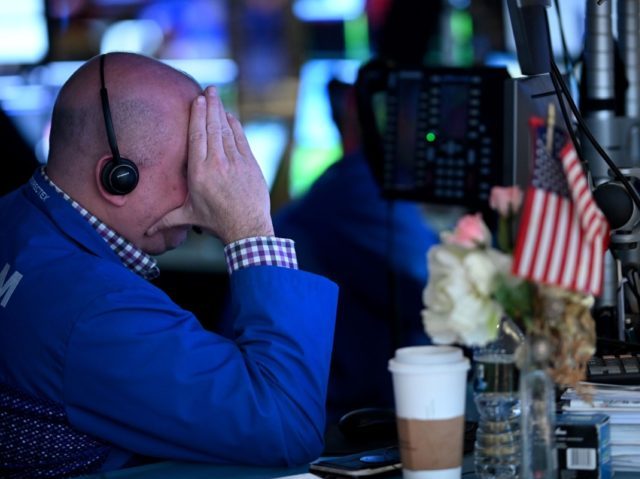The stock market really needs to stop touching its face.
New fears of the economic fallout from the coronavirus, lower bond yields, and a sharp decline in oil pushed stock prices lower Friday, hitting every major industry sector and every major index. Investors selling stocks evidentially fled to the safety of government bonds, pushing prices up far enough that yields fell to virtually zilch.
But in the end things were nowhere near as bad as they seemed, with the major indexes cutting their losses in half in the final hour or so of trading.
The Dow Jones Industrial Average ended Friday down by just 255 points, or around 1 percent, far above the lows of the day and slightly in positive territory for the week. Every stock on the blue-chip index fell with the exceptions of drug-maker Merk, Walmart, Walgreens Boots Alliance, the pharmacy operator, and 3M, which manufacturers facemasks.
Plus Disney, which ended the day just barely in positive territory, up one-tenth of one percent. This was one of the indications that investors have begun to entertain some hesitancy about the wisdom of investing around the thesis that we are all doomed. Disney, after all, makes a substantial portion of its money from theme parks and movie theaters, those social businesses said to be doomed by the outbreak. Streaming can only make up for so much of that, no matter how many kids get to stay home because someone coughed in the cafeteria.
The S&P 500 fell 1.7 percent and the Nasdaq Composite by around 1.8 percent. While all eleven sectors of the S&P fell on Friday, illustrating just how broad the market decline was on Friday, both indexes more or less cut their daily losses in half in the final hour of trading.
Then there were airlines, one of the few official industrial subsectors of the S&P 500 to see gains for the day. Airlines have been beaten up this year, with the sector down by more than 23 percent year to date, so Friday’s 1.4 percent gain is hardly making investors in flying tubes of shared atmosphere wealthy. But if you squint your eyes–without touching your face–you can almost spot a mote of hope lurking beyond the viral beam with which equity markets have been being beaten for two weeks.
Incidentally, personal products and household products segments were also up for the day. Have you checked out the shelves of your local big box store?
On the other hand, the worst performers in the Dow were not those directly suffering from coronavirus impact but victims of community transmission. Shares of J.P. Morgan Chase were down by around 5.5 percent, only a tiny bit of which can fairly be attributed to the surprise hospitalization of its charismatic chief executive, Jamie Dimon. Most of the decline should be attributable to the decline in interest rates predicted by bond yields, which promises to squeeze lending margins. The same interest rate pressure weighed on shares of Goldman Sachs, which fell around 3.4 percent, American Express, and Visa.
Yields on U.S. government debt were down across the board, with investors seeking safe-haven assets and convinced that the Federal Reserve will drop rates even further. The yield on the benchmark 10-year Treasury fell to 0.78 percent, a new closing low but well above the 0.66 percent hit earlier in the day. The 30-year yield fell to 1.29 percent, a level that was considered ultra-low for the 10-year just a few months ago. The 3-month yield fell to 0.469 percent.
The bond market does seem to be washing its hands these days. The yield curve is no longer inverted and has actually been steepening a bit lately, which is at least a whispered suggestion that the coronavirus will not push the U.S. into a deep recession.
The second-worst performing stock on the Dow was ExxonMobil, suffering from worries about demand due to coronavirus drag on airlines, slackening global demand, and the failure of Russia and OPEC to reach a deal to raise oil prices. The latter took commodities traders by surprise and sent oil prices sliding 10 percent on Friday, a huge single-day move.
Microsoft took the third-from-the-bottom position on the Dow. This is perhaps the clearest sign that investors are worried that the outbreak could have broader economic effects.

COMMENTS
Please let us know if you're having issues with commenting.